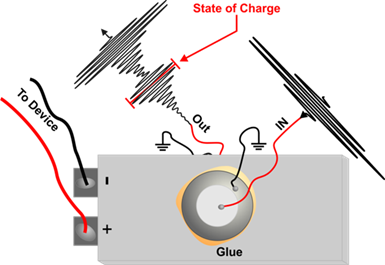Conclusion;
Spartacus developed a strain /compression sensor based on dielectric elastomer sensors. This technology is easily adapted to different kind of battery cell and packages and Spartacus has filed a patent that refers to this sensor type. Spartacus also managed to design a cost-effective electronic that paves the way for a commercialization and realized cell management systems (CMS) as part of a battery management systems (BMS), including a pre-processing board that can handle very different date in different rates, units and sizes and has to extract the right management rules based on the models created. The determination of state of health (SoH) is, thereby, much more robust.
Introduction text in the beginning of project;
The global objective of the Spartacus project is to develop an affordable sensor solution to detect degradation and failure mechanisms, intentionally before a loss of performance. The project will focus on mechanical and acoustic sensors completed by electrochemical impedance measurement and temperature sensors. The sensoric data will be correlated to battery performance and to corresponding models. The state of different parameters (SoX) will be continuously monitored in order to enable the management system to cycle the battery on an age-dependent optimum level. An advanced Battery Management System (BMS) will be developed. BMS will work in proximity to the cells terminals (i.e. a cell management system, CMS) to efficiently exploit all the sensoric data without extra-wiring harness. At the end of the project, an 24V smart battery module will be assembled and the CMS enhanced by the sensoric data will be validated in different ageing conditions or for misused or abused batteries at lab-scale (TRL4). Quantitatively, a reduction of 20% charging time without any negative effect on life time by exploitation of sensoric data is targeted. By usage of sensoric data, cell monitoring will be also improved and will increase the safety of batteries and avoid overheating (thermal runaway), fire or explosion.
Objectives:
The global objective of the SPARTACUS project is to allow for fast charging of battery modules without any substantial negative impact on lifetime / cycle life by the implementation of an array of mechanical, acoustic, thermal and advanced impedance sensors integrated on individual cells.
- Objective 1: Development of new sensors design for smart batteries
- Objective 2: Integration of the sensors according to industrial constraints
- Objective 3: Data acquisition and data pre-processing for BMS integration
- Objective 4: Modelling of failure mechanisms and correlation with SoX
- Objective 5: Development of an advanced BMS and standardization procedures
- Objective 6: Economic and environmental assessment
Fraunhofer Gesellschaft zur Foerderung der Angewandten Forschung E.V. (Fraunhofer), Germany
Contact: Head of Center Smart Materials and Adaptive Systems, Gerhard Domann
Email: gerhard.domann@isc.fraunhofer.de


